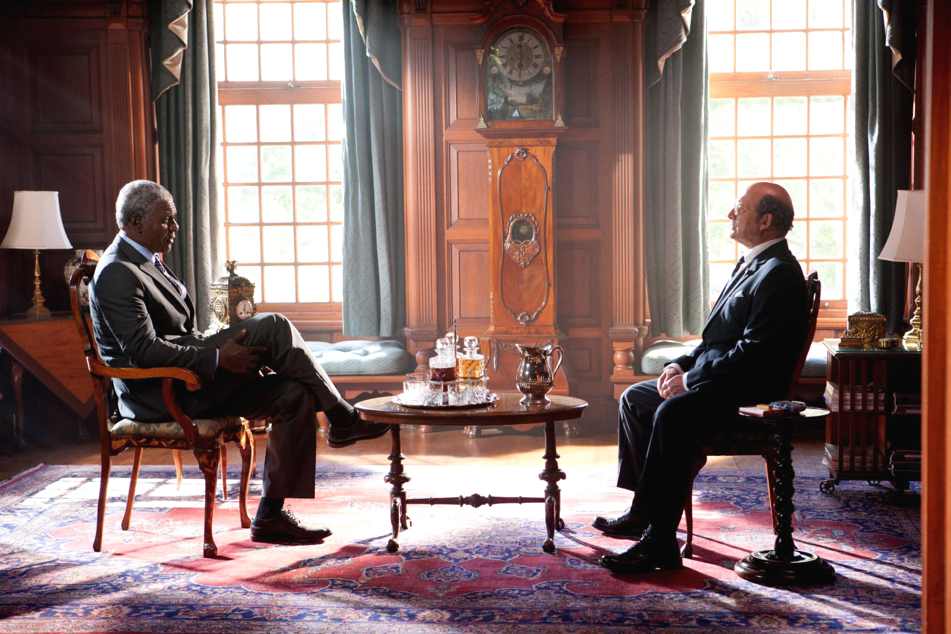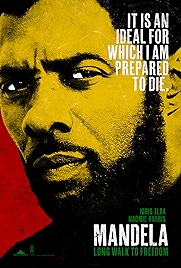A movie for every day of the year – a good one
27 April
Freedom Day, South Africa
Today is Freedom Day in South Africa. It marks the day in 1994 when South Africa went to the polls in the first national elections open to all races. Voting lasted for three days, with people lining up patiently in long queues to take their turn and get their hand stamped in indelible ink. The African National Congress won the election, with just over 62% of the nearly 20 million votes cast and, Nelson Mandela became the country’s president, its first black leader.
Mandela: Long Walk to Freedom (2013, dir: Justin Chadwick)
On the day that this film had its world premiere in London – just as the screening was about to start, in fact – two of Nelson Mandela’s children, who were attending, learned that their father had died. The screening went ahead and when it had finished the audience were also told what had happened. There was then a spontaneous two-minute silence as a mark of respect for Mandela’s life. That sort of thing is fine in real life, but does no favours for a film, which needs to keep moving forwards and to stand on its own merits. More to the point, Mandela’s death eclipsed the film about his life. Which is a pity because it is a very good film – unusually good for a biopic. Reasons why are various, but director Justin Chadwick’s experience directing period drama for TV must be a big factor. He made the BBC’s Bleak House, an adaptation of Charles Dickens, so understands how important it is not be awe-struck in the face of the iconic. Idris Elba also seems to get this too. His Mandela is a very human person, even if he is forced, due to time restrictions, to jump quickly through the hoops and age very quickly – attractive partying lawyer in the late 1940s to political firebrand in the early 1960s to defiant prisoner to greying statesman in waiting – and Elba gets the voice (surely the most recognisable on the planet) just right. Chadwick meanwhile is in Richard Attenborough mode – crowd scenes, period detail, extravagant speeches, big events seen from a personal perspective – and for some the lack of more “politics” and the broad brush is going to seem like an opportunity missed. What exactly prompted white South Africa to start making overtures towards a man who was essentially tucked away out of harm’s way? Was it the international campaign to free him? The fall of the Iron Curtain? The sporting bans and pariah status of the country? We don’t find out.
To compensate we see more of Winnie Mandela’s story than a more timid film would have dared to cover. Winnie the fighter, who made some terrible decisions, is portrayed as the one who got her hands dirty while her husband had, to some extent, the easier option of being removed from that sort of dirty daily compromise – it’s easy to be virtuous when you’re out of the way of temptation. Naomie Harris is an amazingly good Winnie; better than Elba in fact, and in a far tougher role.
If you don’t know who Nelson Mandela is, or what he did, this film won’t fill in many gaps – it is necessarily an episodic jaunt through largely familiar territory. Where it excels is in its portrayal of the forging of Mandela’s noble character, how it was entirely infectious and won over the most sceptical, bitter foe. And it makes a slightly unfashionable case for leaders leading from the top down. It’s a tough genre, the biopic, with serial killers usually getting a better go of it than people like Mandela, who usually end up being treated as saints. It is to the film’s great credit that it doesn’t do that. Instead Long Walk to Freedom is, like the man himself, firm but fair.
Why Watch?
- Idris Elba and Naomie Harris’s great performances
- An epic biopic beautifully handled
- The taut screenplay by William Nicholson (Gladiator)
- Justin Chadwick’s brisk unsentimental direction
Mandela: Long Walk to Freedom – at Amazon
I am an Amazon affiliate
© Steve Morrissey 2014

